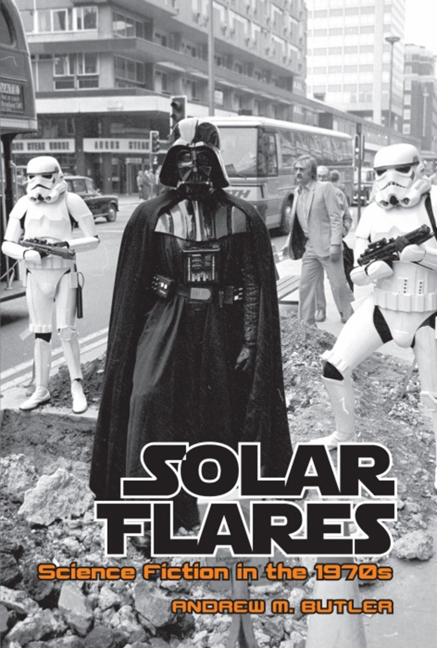Book contents
- Frontmatter
- Dedication
- Contents
- Acknowledgements
- Prologue
- 1 The Ends of First Sf: Pioneers as Veterans
- 2 After the New Wave: After Science Fiction?
- 3 Beyond Apollo: Space Fictions after the Moon Landing
- 4 Big Dumb Objects: Science Fiction as Self-Parody
- 5 The Rise of Fantasy: Swords and Planets
- 6 Home of the Extraterrestrial Brothers: Race and African American Science Fiction
- 7 Alien Invaders: Vietnam and the Counterculture
- 8 This Septic Isle: Post-Imperial Melancholy
- 9 Foul Contagion Spread: Ecology and Environmentalism
- 10 Female Counter-Literature: Feminism
- 11 Strange Bedfellows: Gay Liberation
- 12 Saving the Family? Children's Fiction
- 13 Eating the Audience: Blockbusters
- 14 Chariots of the Gods: Pseudoscience and Parental Fears
- 15 Towers of Babel: The Architecture of Sf
- 16 Ruptures: Metafiction and Postmodernism
- Epilogue
- Bibliography
- Index
5 - The Rise of Fantasy: Swords and Planets
- Frontmatter
- Dedication
- Contents
- Acknowledgements
- Prologue
- 1 The Ends of First Sf: Pioneers as Veterans
- 2 After the New Wave: After Science Fiction?
- 3 Beyond Apollo: Space Fictions after the Moon Landing
- 4 Big Dumb Objects: Science Fiction as Self-Parody
- 5 The Rise of Fantasy: Swords and Planets
- 6 Home of the Extraterrestrial Brothers: Race and African American Science Fiction
- 7 Alien Invaders: Vietnam and the Counterculture
- 8 This Septic Isle: Post-Imperial Melancholy
- 9 Foul Contagion Spread: Ecology and Environmentalism
- 10 Female Counter-Literature: Feminism
- 11 Strange Bedfellows: Gay Liberation
- 12 Saving the Family? Children's Fiction
- 13 Eating the Audience: Blockbusters
- 14 Chariots of the Gods: Pseudoscience and Parental Fears
- 15 Towers of Babel: The Architecture of Sf
- 16 Ruptures: Metafiction and Postmodernism
- Epilogue
- Bibliography
- Index
Summary
Technology, with its potential to be misused, had long been distrusted – the threat of the Bomb and the war machine in Vietnam being merely the latest sources of anxiety. In his survey of the representation of technology in popular film, Steven L. Goldman notes that the films’ ‘messages, deliberately crafted to appeal to what were believed to be widely prevalent attitudes, values, and fears, have remained pretty much the same’ (1989: 289), which is to say, broadly anti-technological. Even highly technologised films, such as the Star Wars trilogy, ‘opposed technology to virtue’ (Goldman 1989: 288) and pitted the purity of Jedi hearts and spirits against the technology of the evil Empire. But, equally, some distrusted the escapism of pure fantasy. Arthur C. Clarke's dictum about the indistinguishability of advanced technology and magic might be dramatised in a novel by the discovery of sophisticated machinery as evidence for forgotten knowledge – as Pratchett shows in The Dark Side of the Sun (1976) and Strata (1981). Besides, the discovery would allow for a kind of conceptual breakthrough that might justify fantasy in terms of ‘cognitive estrangement’ (Suvin 1979: 7), although Suvin was to dismiss fantasy for another two decades (2000). The possible scientific explanation for magic puts such texts into the genre outlined by Tzvetan Todorov in The Fantastic (1970; translated into English 1973), hesitating between the marvellous and the uncanny. The 1970s featured the publication of much science fantasy and, especially in the second half of the decade, a boom in fantasy.
Just as some of the sf of the period looked back to Shelley, Wells and Verne, sword and planet fiction recalled Robert E. Howard's Conan stories and Edgar Rice Burroughs's Barsoom books, which could be located on the fantasy side of science fiction. This chapter will begin with an examination of such science fantasy, including films inspired by Edgar Rice Burroughs's novels and Zardoz (John Boorman, 1973), before going on to consider the Tolkienesque tradition and the response to it, as well as bestselling works by Anne McCaffrey, Piers Anthony and Robert Silverberg. It will end with an examination of fantasy in music and role-playing games.
- Type
- Chapter
- Information
- Solar FlaresScience Fiction in the 1970s, pp. 65 - 77Publisher: Liverpool University PressPrint publication year: 2012



